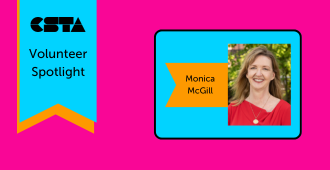Welcome to the CSTA Volunteer Spotlight series, where we celebrate the incredible individuals who dedicate their time and passion to making a difference in the CSTA community. Join us in recognizing and appreciating the extraordinary efforts of Monica in their role as Editorial Board Committee Member.
What inspired you to volunteer your time with CSTA? How has this experience impacted you?
I founded the Institute for Advancing Computing Education (IACE) non-profit as a research institute focused on building the capacity of K-12 CS education in impactful, evidence-driven ways—and for all students, not just a few. Having the opportunity to work closely with CSTA helped me understand more of what teachers need to teach CS to all students.
How long have you been involved with CSTA, and what motivated you to join?
I’ve been involved with CSTA for nearly ten years now—first, with having CSTA represented in a National Science Foundation grant to represent teacher voices. This has grown now to our IACE team working on several projects with CSTA and more closely with teachers. It’s always a joy to have the opportunity to work directly with and learn from teachers.
Can you share any memorable experiences or highlights from your involvement with CSTA?
I love it when we bring teachers and researchers together to learn from each other. I’m a firm believer in researchers not telling teachers how to solve their problems—rather, teachers should be telling researchers what their needs are and researchers should investigate those as much as possible with teachers. In 2022, our team (along with Dr. Adrienne Decker) held a workshop with nearly 30 teachers and researchers together. It was an amazing Day of Dialogue between the two. I’d love to do more of those.
How has CSTA impacted your teaching career and professional development?
IACE’s work with CSTA continues to ensure our team (including me) is up to date with standards, curriculum, and so much more. For example, our work with the Reimagining CS Pathways project of high school students really pushed us to think with a community of practitioners about what future needs are of CS education and how we can create a way to get there.
In what ways do you see CSTA shaping the future of computer science education?
I still hold it to be true that K-12 CS education will be the one thing that drives changes at the postsecondary level. Having taught the introductory CS course in college for nearly 15 years, it is easy to see how students in the future will already know many of the concepts taught in Year 1 (CS1 & CS2). This could put more students on a level playing field and provide the opportunity for a more diverse set of students opting to major in CS and fewer being “weeded out.”
Are there any specific initiatives or projects within CSTA that you’ve been particularly passionate about?
Right now, I’m most excited about engaging teachers in research. We’re always in search of teachers who want to be involved in research in their classrooms or in other ways. We’re just always super stoked to include teacher voices in our studies.
What does the future of CSTA look like?
CSTA has the real potential to impact teaching in many ways at a time when overall teacher morale is low due in part to being underpaid, overworked, and underappreciated. CSTA brings community and inspiration to many teachers who understand the importance of CS. The future of K-12 CS teachers is bright due in part to CSTA. As CSTA grows, they can provide more support to more teachers—which ultimately leads to more students from a variety of backgrounds learning CS.

